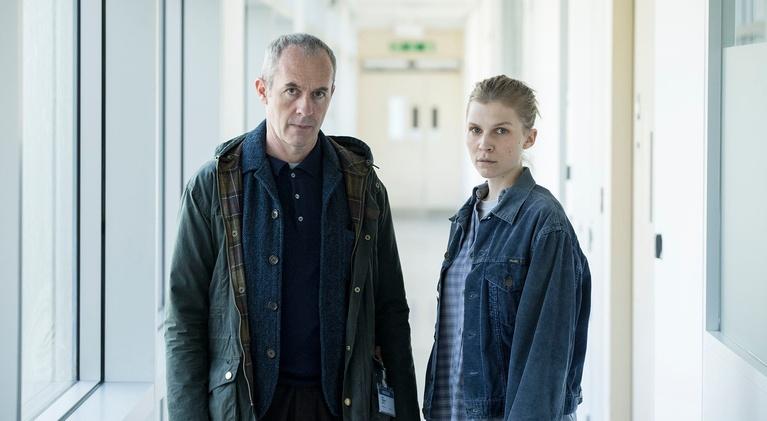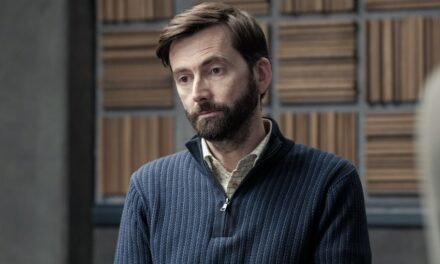
The Tunnel, a remake of Scandinoir favorite The Bridge (Broen), ended the series with season 3, titled “Vengeance”, which aired on PBS in the U.S., and is now available on Amazon Prime. The premise of all versions of the series is that when a body is found in the middle of a bridge (or in a tunnel) between 2 countries, a veteran male detective from one country must work with a brilliant but socially inept (possibly on the spectrum) female detective from the other country. There is tension and in some cases a rivalry between the countries’ police forces, but for the two central characters, their odd-couple partnership becomes a grudging, then very real friendship. If you haven’t seen any of the series (FX’s The Bridge, Denmark’s Broen or the UK’s The Tunnel*), they are all excellent for at least 2 seasons. Which brings us to season 3 of The Tunnel.
A Promising Start
Some time has passed since the events of last season, during which Elise (Clémence Poésy) voluntarily stepped down from commander of her unit, and Karl (Stephen Dillane, aka Stannis Baratheon of GOT) left his wife Laura. Karl and Elise are brought together in season 3 by an explosion of a boat in the center of the channel which was carrying 3 Syrian refugee children, who are now missing. Except that they aren’t. In the morning, they are found placed in the beds of three white British children who have been abducted. In the ensuing investigation (the kids are found unhurt) Elise and Karl discover that their nemesis this season calls himself The Pied Piper, who you will remember from fairy tales, used a melody to lure both rats and children away from town. *Gulp* It’s a gripping start, and it holds together for the first half of the season, but the last half gets bonkers.
Super Villain
The Pied Piper commits gruesome, Seven-like murders (of adults), leaving macabre clues at each crime scene. It becomes clear that a child named Saban, who was last seen in Sarajevo in 1994, is central to this mystery. Turns out the Pied Piper is actually a duo-a murderous grieving mother who last saw her toddler son Saban when she handed him over to a smuggler to get him out of the Balkans, and a mentally unstable younger man whose mother abandoned him and his sister when they were kids. Calling Dr. Freud! They are using the crimes to force the police to look for her son, who was once a refugee, and therefore beneath the police’s interest. It’s a compelling backstory, but the problem is that these two people-a refugee mother who lives in a trailer on the coast and a delusional loser who lives with his sister, pull off Bond-villain level crimes. Using creepy animations and a recording of a garbled lullaby, they not only lure people to their meticulously planned, complex deaths, but immediately afterward, taunt the police. Where is this happening? Does the trailer park even have Wi-fi??
A Distracting Sub-Plot
Another complaint is that Elise and Karl are separated for several episodes. While he is on the hunt for the Pied Piper, she is distracted by an old case of hers that just blew up in her face. While searching for the missing refugee children in episode 1, Elise stumbles upon a kid named Charlie Moreau, who has been presumed dead for years. In fact, she put away his father for killing him! Again, it’s an interesting premise, but it doesn’t serve the story except to manufacture a rift between Karl and Elise. I also have a huge problem with the end, but in the interest of keeping this spoiler-free, I won’t say another word.
The Problem with Peak TV
Making peak television is tough. You get a hit the first season and suddenly you have to churn out several more, with far less time for development. Therefore, it’s rare to find a series of even quality. Even keeping that in mind, this season is a disappointment. Although the performances are great, especially the leads, and the chemistry is still there, nothing else feels organic. You can see the cogs move in the plot-making machine. And with maybe a little more time, the writers could have shaved off the rough edges, cut out the obvious machinations, and provided some plausibility, because it had the makings of a fantastic season-episode 1 was a real gripper, the story was genuinely sad, and the politics of refugees compelling. Alas, it was not to be.
*Note that there is a Germany/ Austria version that hasn’t made it to the US yet, and an African version is in development.
Looking for more of the best in foreign TV? Don’t miss our other great reviews HERE!






